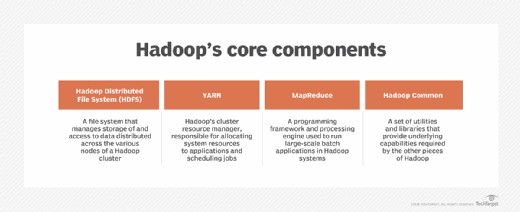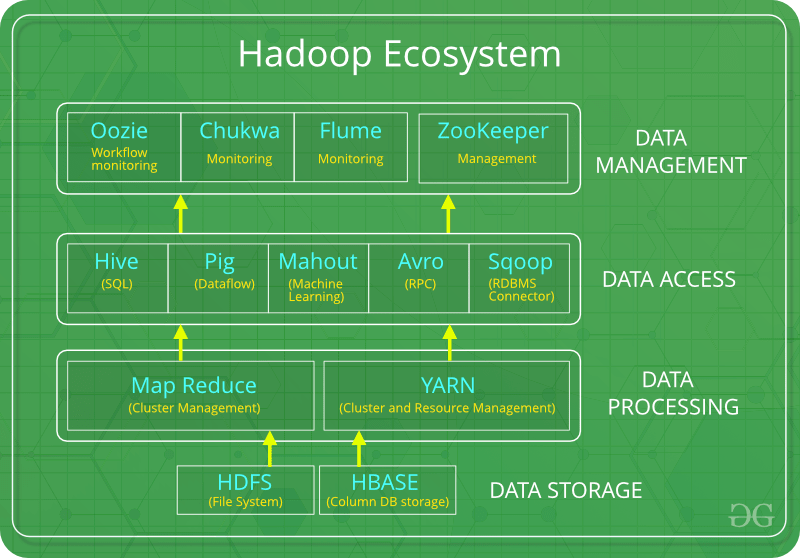data-utilities/hadoop
(2025-08-27T20:21.343Z)
Perplexity Query
(2025-08-27T20:21
.343Z)
Question:
Write a comprehensive one-page article about "Hadoop".
Response from sonar-pro:
Hadoop is an open source software framework designed to efficiently store and process vast volumes of data using Distributed Computing across clusters of commodity hardware.
[o7b71h]
[z2hvr3]
[2c0gnp]
Its significance stems from the explosion of big data generated by the internet, social media, sensor networks, and transactional systems, creating both a need and an opportunity for organizations to extract actionable insights from enormous datasets quickly and cost-effectively.
[o7b71h]
[z2hvr3]

At its core, Hadoop leverages a distributed computing model that splits data and computation across many machines to handle datasets ranging from gigabytes to petabytes.
[7qreui]
[2c0gnp]
This system is built on four main modules:
- Hadoop Distributed File System (HDFS): A specialized file system that stores data across multiple nodes for high throughput and fault tolerance.
- MapReduce: A programming model enabling parallel processing of large data sets by dividing tasks into "map" and "reduce" functions.
For example, retail organizations leverage Hadoop to analyze customer purchasing patterns and optimize inventory by processing sales logs and social media data at scale. In the healthcare sector, Hadoop is used to aggregate and analyze vast clinical and patient datasets to inform treatment protocols or predict disease outbreaks.
[7qreui]
Financial institutions utilize Hadoop to detect fraudulent transactions by analyzing streams of real-time data with historic records, and telecommunications companies run Hadoop clusters to process network logs and enhance service reliability.
[2c0gnp]
The benefits of Hadoop are substantial:
- Cost-effectiveness: Runs on commodity hardware and is free to use, reducing upfront investment. [z2hvr3]
However, Hadoop presents notable challenges. Its complexity can demand high expertise to install, manage, and optimize a cluster. Moreover, its reliance on frequent disk input/output for computations can be inefficient compared to newer in-memory systems.
[9h6zt8]
Security, data governance, and integration with existing enterprise technologies also require careful consideration.

Currently, Hadoop plays a diminished but still vital role in the big data ecosystem. While key adopters—such as Yahoo, Facebook, and Twitter—have built significant data infrastructures on Hadoop, many organizations are moving toward cloud-native platforms or modern “lakehouse” architectures that offer better integration and performance.
[9h6zt8]
Major commercial distributions of Hadoop, including those from Cloudera and Hortonworks, have merged or evolved to address shifting requirements and to support hybrid cloud solutions. The Hadoop ecosystem has also inspired a wide array of complementary technologies, such as Apache Spark (for fast, in-memory data processing) and Apache Hive (for SQL-like queries on big data).
[9h6zt8]
[z2hvr3]
Recent trends indicate a movement away from pure Hadoop-based solutions toward managed cloud services, Serverless architectures, and integrated analytics platforms. Public cloud providers, including AWS, Azure, and Google Cloud, offer scalable Hadoop-compatible storage and processing, but increasingly advocate their own data lake, AI, and analytics services.
[2c0gnp]
Nevertheless, the core principles of Hadoop—distributed storage and parallel computation—remain foundational in many enterprise data strategies.

Looking ahead, Hadoop’s architectural ideas continue to shape the evolution of Big Data processing. The platform itself is likely to see reduced direct adoption, with growth shifting to cloud-native, scalable, and AI-enabled data ecosystems that offer more simplicity, real-time analytics, and lower operational overhead. Yet, for organizations managing massive, diverse data assets, Hadoop and its descendants will continue to play a pivotal role in democratizing access to big data computation.
Hadoop transformed how organizations handle and analyze massive datasets, paving the way for the modern era of data-driven decision making. As big data needs and technologies evolve, Hadoop’s legacy will remain central to the future of scalable data platforms and analytics innovation.
Citations
[o7b71h] 2025, May 17. What Is Hadoop?. Published: 2025-04-29 | Updated: 2025-05-17
[7qreui] 2025, Aug 20. What Is Hadoop and What Is It Used For? | phoenixNAP Blog. Published: 2024-02-14 | Updated: 2025-08-20
[9h6zt8] 2025, Jun 16. Apache Hadoop: What is it and how can you use it?. Published: 2025-05-26 | Updated: 2025-06-16
[z2hvr3] 2025, Apr 30. Hadoop: What it is and why it matters. Published: 2025-04-29 | Updated: 2025-04-30
[2c0gnp] 2025, Jul 22. What is Hadoop? - Apache Hadoop Explained. Published: 2025-07-18 | Updated: 2025-07-22
